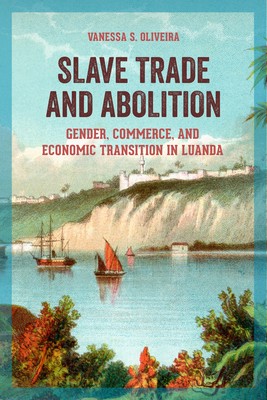
- We will send in 10–14 business days.
- Author: Vanessa S Oliveira
- Publisher: University of Wisconsin Press
- ISBN-10: 0299325849
- ISBN-13: 9780299325848
- Format: 15 x 22.6 x 1.2 cm, softcover
- Language: English
- SAVE -10% with code: EXTRA
Reviews
Description
Well into the early nineteenth century, Luanda, the administrative capital of Portuguese Angola, was one of the most influential ports for the transatlantic slave trade. Between 1801 and 1850, it served as the point of embarkation for more than 535,000 enslaved Africans. In the history of this diverse, wealthy city, the gendered dynamics of the merchant community have frequently been overlooked.
Vanessa S. Oliveira traces how existing commercial networks adapted to changes in the Atlantic slave trade during the first half of the nineteenth century. Slave Trade and Abolition reveals how women known as donas (a term adapted from the title granted to noble and royal women in the Iberian Peninsula) were often important cultural brokers. Acting as intermediaries between foreign and local people, they held high socioeconomic status and even competed with the male merchants who controlled the trade. Oliveira provides rich evidence to explore the many ways this Luso-African community influenced its society. In doing so, she reveals an unexpectedly nuanced economy with regard to the dynamics of gender and authority.EXTRA 10 % discount with code: EXTRA
The promotion ends in 17d.17:23:33
The discount code is valid when purchasing from 10 €. Discounts do not stack.
- Author: Vanessa S Oliveira
- Publisher: University of Wisconsin Press
- ISBN-10: 0299325849
- ISBN-13: 9780299325848
- Format: 15 x 22.6 x 1.2 cm, softcover
- Language: English English
Well into the early nineteenth century, Luanda, the administrative capital of Portuguese Angola, was one of the most influential ports for the transatlantic slave trade. Between 1801 and 1850, it served as the point of embarkation for more than 535,000 enslaved Africans. In the history of this diverse, wealthy city, the gendered dynamics of the merchant community have frequently been overlooked.
Vanessa S. Oliveira traces how existing commercial networks adapted to changes in the Atlantic slave trade during the first half of the nineteenth century. Slave Trade and Abolition reveals how women known as donas (a term adapted from the title granted to noble and royal women in the Iberian Peninsula) were often important cultural brokers. Acting as intermediaries between foreign and local people, they held high socioeconomic status and even competed with the male merchants who controlled the trade. Oliveira provides rich evidence to explore the many ways this Luso-African community influenced its society. In doing so, she reveals an unexpectedly nuanced economy with regard to the dynamics of gender and authority.

Reviews